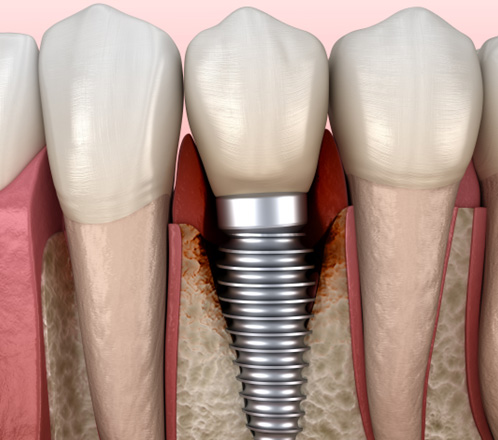Dental Implant Failure & Salvage Austin
Save Your Restored Smile
Dental implants boast an impressive success rate; they do well in more than 95% of cases. Of course, as remarkable as that statistic is, it does still leave the possibility of dental implant failure. If you ever believe that one of your implants is not as healthy as it should be, contact our Austin dental team right away. We will do all we can to save your restored smile so you can get back to enjoying excellent oral health.
Why Do Dental Implants Fail?

When dental implants fail, it is most often due to an infection known as peri-implantitis. It occurs when harmful bacteria are allowed to multiply in the mouth and invade the gum tissue. They can eventually cause so much damage to both the gums and the underlying bone structure that the implants lose their base of support. Missteps in oral hygiene are usually a major contributing factor to the development of peri-implantitis.
Other possible reasons for failed dental implants include:
- Failure of the implants to bond with the surrounding tissue (failed osseointegration).
- Underlying medical conditions, such as bone diseases or certain types of cancer.
- Injuries to the jaw.
Symptoms of a Failed Dental Implant

Dental implant failure can occur at any time, whether it is weeks, months, years, or even decades after the initial placement surgery. Therefore, it is important that you remain alert for signs of dental implant failure.
Here are some reasons to call our team for assistance:
- Signs of infection. Swelling, redness, gum recession, and pus could all indicate the presence of peri-implantitis.
- After you heal from your implant surgery, you should enjoy pain-free function from your new teeth. Severe or prolonged pain should be assessed by a qualified dental professional.
- Difficulty chewing. It should be easy for you to eat virtually any type of food with your dental implants. Difficulty chewing may indicate that your prosthetic teeth are in danger of failing.
- An implant feels loose. This could be a problem with the implant itself or the restoration (crown, bridge, or denture) that is attached to it.
How Dental Implant Salvage Works

You should call us as soon as you suspect that something is wrong with your dental implants. If you wait too long, you give the problem an opportunity to worsen. On the other hand, if you receive prompt treatment, we may be able to address the issue via conservative and relatively inexpensive means.
When you come in for your appointment, we will perform a thorough visual examination of your mouth and use imaging equipment to see what is happening beneath your gumline. Once we understand the problem, we can recommend your next steps. You might need something as simple as a new restoration or some antibiotics. However, there is also the possibility that your failing implant will need to be completely removed. Later, after a healing period and any necessary additional care, you may become eligible to receive a new one.
